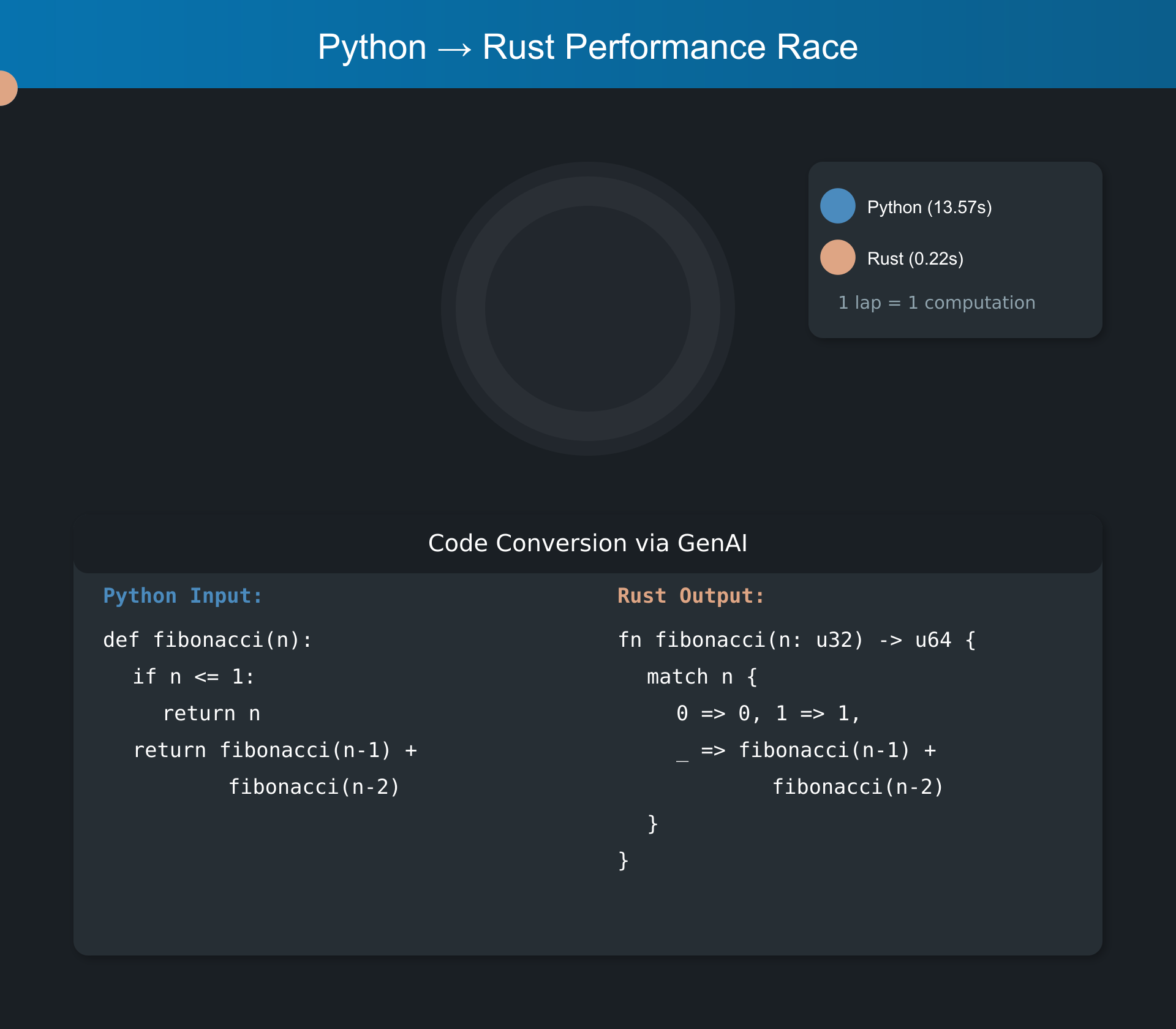60x Faster: Transforming Python to Rust with GenAI
🚀 Want to make your Python code run 60 times faster without complex optimizations? Through the power of GenAI and Rust, we're revolutionizing how developers approach performance optimization. In this eye-opening demonstration, we'll show you how a simple copy-paste operation with modern AI tools can transform slow Python scripts into blazing-fast Rust binaries.
Do you want to learn AWS Advanced AI Engineering?
Production LLM architecture patterns using Rust, AWS, and Bedrock.
Check out our course!
The Performance Challenge
Exposing Python's Limitations
Let's tackle a classic computer science problem: recursive Fibonacci calculation. Our intentionally simple Python implementation helps illustrate a common challenge many organizations face - computationally expensive scripts that bottleneck operations.
Here's our complete Python implementation (fibonacci.py):
import sys
def fibonacci(n):
if n <= 1:
return n
else:
return fibonacci(n-1) + fibonacci(n-2)
def main():
if len(sys.argv) != 2:
print("Usage: python fibonacci.py <n>")
sys.exit(1)
n = int(sys.argv[1])
result = fibonacci(n)
print(f"Fibonacci({n}) = {result}")
if __name__ == "__main__":
main()
When calculating Fibonacci(40), our Python script takes a whopping 13.57 seconds. This isn't just about numbers - it's about developer productivity, infrastructure costs, and user experience.
The Rust Revolution
Enter Rust - a modern, compiled language that combines performance with safety. Using GenAI tools like Claude or DeepSeek, we can instantly convert our Python code to optimized Rust. Here's the complete Rust implementation (fibonacci.rs):
use std::env;
fn fibonacci(n: u32) -> u64 {
match n {
0 => 0,
1 => 1,
_ => fibonacci(n - 1) + fibonacci(n - 2),
}
}
fn main() {
let args: Vec<String> = env::args().collect();
if args.len() != 2 {
eprintln!("Usage: {} <n>", args[0]);
std::process::exit(1);
}
let n: u32 = args[1].parse().expect("Please provide a valid number");
let result = fibonacci(n);
println!("Fibonacci({}) = {}", n, result);
}
The results? The same calculation now takes just 0.22 seconds. That's a 61.68x performance improvement! 🏃♂️💨
Real-World Benchmarks
Let's look at the actual timing results:
➜ python-vs-rust git:(main) ✗ time ./fibonacci 40
Fibonacci(40) = 102334155
./fibonacci 40 0.21s user 0.00s system 99% cpu 0.216 total
➜ python-vs-rust git:(main) ✗ time python fibonacci.py 40
Fibonacci(40) = 102334155
python fibonacci.py 40 13.56s user 0.00s system 99% cpu 13.566 total
Key Benefits
- Instant Optimization: Transform Python code to Rust with a simple copy-paste into GenAI tools
- Massive Performance Gains: Achieve ~60x speed improvements without complex optimizations
- Modern Security: Leverage Rust's memory safety and thread safety guarantees
- Simplified Deployment: Generate standalone binaries without dependency headaches
The Power of GenAI Translation
Using tools like Claude or DeepSeek, the conversion process is remarkably straightforward:
- Paste your Python code
- Request a Rust conversion "without cargo"
- Compile with
rustc -O fibonacci.rsfor optimization - Experience dramatic performance improvements
Try It Yourself
Want to experiment with this code? We've made the complete source code available in our AWS-Gen-AI repository:
Python vs Rust Performance Example
This isn't just about faster code - it's about transforming how we think about optimization. No more complex C libraries or multi-language orchestration. Just clean, fast, secure Rust code, generated in seconds.
Ready to revolutionize your Python scripts? Join us at Pragmatic AI Labs where we're exploring the cutting edge of AI-powered development.
👉 Subscribe to our platform: https://ds500.paiml.com/code
Recommended Courses
Based on this article's content, here are some courses that might interest you:
-
AWS Advanced AI Engineering (1 week)
Production LLM architecture patterns using Rust, AWS, and Bedrock. -
Natural Language AI with Bedrock (1 week)
Get started with Natural Language Processing using Amazon Bedrock in this introductory course focused on building basic NLP applications. Learn the fundamentals of text processing pipelines and how to leverage Bedrock's core features while following AWS best practices. -
Enterprise AI Operations with AWS (2 weeks)
Master enterprise AI operations with AWS services -
Natural Language Processing with Amazon Bedrock (2 weeks)
Build production NLP systems with Amazon Bedrock -
Generative AI with AWS (4 weeks)
This GenAI course will guide you through everything you need to know to use generative AI on AWSn introduction on using Generative AI with AWS
Learn more at Pragmatic AI Labs